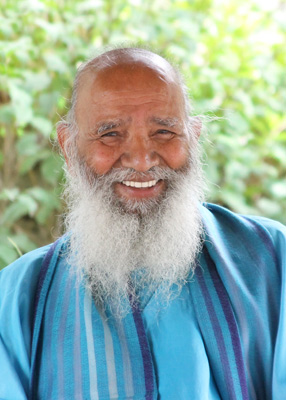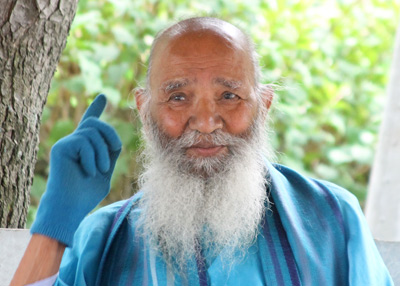How Would You Know The Truth
If You Are Clinging To Untruth?

Gangesh: … I hear about Brahm (Absolute Oneness) and that the world is illusory, that the world is there and somehow I have to reach Brahm…
Swamiji: I have used the word Brahm because Samuel came [from the Shankaracharya school]. I don’t say Brahm, I say Amaram, I say Madhuram—which is prior to Brahm. You can reach up to Brahm, but you say that before Brahm there is nothing. You reach the world—you can reach the world, which you call Brahm. So Brahm is just a word you use; instead of “God,” you say Brahm. To say, “God” you need a human being, and if you need a human being, then a human being says, “I exist, God does not exist.” Yet he says, “God.” That means, the human tradition is the tradition of form. Form appears, so he says that form exists. To him, that is sat, that is the truth. When form disappears, then he says it is untruth. This is a human being. So he [Gangesh] begins with this. Go ahead.
Gangesh: It feels that we have an implicit understanding that we are in saadhana (practice for Self Realization), that saadhana is in time and space, and that it takes time to reach somewhere. Whereas, as you said, Amaram Hum Madhuram Hum, which is the goal, is outside of the realm of time, it’s not bound by time. In me, there is always a feeling, an understanding or yearning that something is wrong. Because, as you said, Amaram Hum Madhuram Hum is prior to time, and prior to Brahm, and prior to efforts and prior to the birth of a human being—who will forget this and then try to make efforts. Whereas Amaram Hum is the unborn Being. So to me there always seems that somewhere I am not content or pleased with my acceptance of saadhana as a process in time and space.
Swamiji: Yes. This explains everything—that he is the one who has been told that “You are human being.” It is that human being whom he calls “I.” Whatever the body is, the senses are, the mind is and the intellect is became his I—tadaatma, tadroop, or the same-same: the same body is the same I, the same I is the same body. That is why you are seeking contentment or fulfillment. Why? Because you are mixed. All the time I am saying, “Pure Free Forever.” But you think that Pure Free Forever is this body. Then you say, “Well, the subtler body is the mind, so Pure Free Forever is that.” Thus, a human being has not been given the power to realize Pure Free Forever. So you, as a human being, are perfectly all right—as a human being—that you are discontent.
Gangesh: The thing is that I know that I get mixed with the human being. Because I know myself prior to being a human being, such as in meditation for instance, when at one point there is no human being, there is no consciousness, there are no ideas, there is no time and space. That, for me, is Amaram Madhuram. I also know that my experience that something comes out of it other than Amaram Madhuram is wrong.
Swamiji: This is not correct. If you are Amaram Hum Madhuram Hum, then it became the source-seed. Out of that, any pot you make, any planet you make, any person you make, any thing you make, is the seed, the same Source. So it is not that out of it ignorance comes, or out of it form comes, or out of it a wave comes, or out of it a bubble comes, or out of it the sun comes. No. It’s all one Being. This has not yet been done. So the grace has not showered, because you cannot make it happen by your efforts. It is God’s grace. Without the grace, without the cloud, rain will not fall. So you are creating a situation that one day grace may fall. You are a human being, and a human being thinks that a human being is born. Whereas you’ve heard me saying, “Tell me, how many years old are you?” You say, “Fifty-one,” or “Fifty-two,” whatever it is. Then I say, “Fifty-two years before, were you born?” How do you know this knowledge, that “I was not born”?
Gangesh: I know it through your teachings and through meditation. You had said that we don’t accept what you say, so we want to experience it. Fortunately enough, I have experienced it, that’s why I accept it. Like you said, to know that the seed alone is can’t be experienced—that I have to accept, whatever we call it, whether acceptance or grace, but that’s what I…
 Swamiji: I just bring this in on your own personal, individual level. This too because I don’t force you to accept what I say. I expect that you will know that I am saying the truth, so automatically you will accept it. But that’s not the way for a human being. And I’m not the type of teacher who will vehemently take a stick and say, “Now you should learn ABCD.” … You are Gil. How did you come to know Gil? Because they said, “You are Gil.”
Swamiji: I just bring this in on your own personal, individual level. This too because I don’t force you to accept what I say. I expect that you will know that I am saying the truth, so automatically you will accept it. But that’s not the way for a human being. And I’m not the type of teacher who will vehemently take a stick and say, “Now you should learn ABCD.” … You are Gil. How did you come to know Gil? Because they said, “You are Gil.”
Gangesh: Swamiji, I came to know Gil only after the waking state took place.
Swamiji: After the waking state took place—you are right. Because you are born. When you are not born, where is the waking state?
Gangesh: That’s why I feel that to blame my parents is not the right attitude…
Swamiji: I don’t blame the world as a whole that they have given each child a name and they have understood each child as that name. They are all right. Why? They are not born. So why should I say that they are not all right? You haven’t come to know this, that you are not born. That is what the whole thing is.
I told Dan and others, “Look, Hariji was never born, so she never died.” He must be thinking, “If he thinks like that, then I have to be quiet. I have done the whole thing. I took her body there, the fire was lit and all that, we did Swaha (offering into the fire—of Self).” But it is Me who is that Being who alone is. I cannot communicate this to you, which means I cannot put this knowledge in you, because you have that blockage which is deep sleep. You are in the waking state, but in deep sleep. You are in the thinking place, but in deep sleep. You are into the imagination place, you are right about imagination—but I’m saying that imagination does not exist, it’s a deep sleep.
So we talk, and we’ve spent more than forty-five years like this. Why? Because you like what I say. That means you are that which I say. But you don’t accept that. That is the whole thing. The moment you accept that, then you will know the birthless Being will be neither content nor discontent. That’s the whole thing. So you are meditating. In meditation, you come to know, “It’s birthless, so it’s deathless.” So you like meditation. Many yogis like meditation, because they begin to think. While thinking, they just meditate and meditate. Then sometimes their thinking goes away, and then they think, “This is wonderful!” But thinking does not exist! I emphasize this, but I’m not expecting that you will know it, because thinking is going on, the waking state is going on. And you think, “No, let me be this, my name, my form. Whatever I am, please don’t touch it.” Yet to me you say, “No, no. Please improve it.” But you don’t want to leave it.
You must have heard the story of King Shikiridwaj. He left his empire. He left everything and went to the jungle. But his wife was intelligent. She said, “Well, that’s not the way for you to live life.” He said, “No. I want to know the Truth.” How would you now know the Truth if you are clinging on to untruth and making it all right? At least you are aware that you are not on the path of Truth. Otherwise, you’d get it. You are on the path of easiness—that no difficulty should be there, no loss should come to you, no irregularity or ignorance should come to you, and then, after satsang, you should live the same life. This is where you can understand: are you not like that? If you are on the path of Truth, then you are the Truth. Then why would Truth be discontent? If you know, “I am the Truth,” why would I be dead? Why would I be worried? Why would I be blind? Why would I be deaf? I is Pure Free Forever. And you have understood this because of both of us together. …
 How can you expect that Samuel, who just came today, knows the Truth? Hardly two minutes have passed here for him. But you say, “No, no, I know the Truth.” Anybody will say, “I know the Truth.” Why? Truth is this and truth is that, truth is everything—that is what your stand is. Whereas Truth is only Truth, in which untruth cannot happen. But then your love comes, attachment comes, raag (attraction) comes, then dwaysh (aversion) comes, and all that. You can understand what a good life I am having for the last forty-five years! Because no wrong is there. He [Samuel] has come, so we say that Truth is there. And you know the Truth, you say, “Absolute Bliss Consciousness.” Why is it not Absolute Bliss Consciousness when you say it? Why do you think otherwise? Then you should at least come to know, “I say this, but I really don’t know it. I know this is food, but I haven’t eaten it.” Thank you very much. God bless you.
How can you expect that Samuel, who just came today, knows the Truth? Hardly two minutes have passed here for him. But you say, “No, no, I know the Truth.” Anybody will say, “I know the Truth.” Why? Truth is this and truth is that, truth is everything—that is what your stand is. Whereas Truth is only Truth, in which untruth cannot happen. But then your love comes, attachment comes, raag (attraction) comes, then dwaysh (aversion) comes, and all that. You can understand what a good life I am having for the last forty-five years! Because no wrong is there. He [Samuel] has come, so we say that Truth is there. And you know the Truth, you say, “Absolute Bliss Consciousness.” Why is it not Absolute Bliss Consciousness when you say it? Why do you think otherwise? Then you should at least come to know, “I say this, but I really don’t know it. I know this is food, but I haven’t eaten it.” Thank you very much. God bless you.
. . . . . . .
Other quotes from this satsang:
Check: is it ignorance or knowledge? But you only pick up ignorance. So much so that you began to think that others are ignorant and the whole world is ignorant—and only you are intelligent.
. . . . . . .
Does this human mind exist? The moment you will try to find out the human mind, it will run away, it will not exist. Then you will be convinced, “Oh, I had been thinking that the human mind exists.” The human mind does not exist! Try to examine this. But you don’t examine it. So we don’t have to worry: the day you will examine this, you’ll be happy.
. . . . . . .
It’s the same intellect which, in order to survive as the intellect, says, “Yes, yes, the intellect doesn’t exist.” [Laughter] It’s so clever!
. . . . . . .
Whatever suits you becomes good and whatever does not suit you becomes bad. The intellect suits you, so it became good. My intellect does not suit me, so I say, “The hell with it.” Something else suits me. Because the intellect makes me different. The moment I’ll be intellectual, I’ll think that you are nobody and I’m the only one. When the intellect is not there, then everybody is aware. Thank you and God bless you.
. . . . . . .
…
Copyright © 1999-2012 International
Meditation Institute. All Rights Reserved